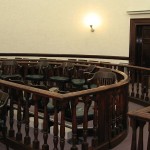Observations by a 3L in a First-Degree Intentional Homicide Jury Pool
 I was recently summoned to serve as a juror in Jefferson County, Wisconsin. As a 3L about to graduate, I have had some recent exposure in my classes and internships to the jury selection process. Being on the other side of the process, being in the pool of potential jurors, gave me some unique insights into the process that I think I may not have ever had otherwise. I took many notes during the course of my time in the pool of potential jurors, and I will share a number of these observations in my blog entries during the month of December. For myself, perhaps the most interesting thing I observed is how the experiences jurors have on the day of jury duty, before entering the courtroom, influence their moods or attitudes once they are in the courtroom.
I was recently summoned to serve as a juror in Jefferson County, Wisconsin. As a 3L about to graduate, I have had some recent exposure in my classes and internships to the jury selection process. Being on the other side of the process, being in the pool of potential jurors, gave me some unique insights into the process that I think I may not have ever had otherwise. I took many notes during the course of my time in the pool of potential jurors, and I will share a number of these observations in my blog entries during the month of December. For myself, perhaps the most interesting thing I observed is how the experiences jurors have on the day of jury duty, before entering the courtroom, influence their moods or attitudes once they are in the courtroom.
The case I was in the jury pool for was State v. Curtis Forbes, a first-degree intentional homicide case being tried in Columbia County with a Jefferson County jury. A few weeks earlier, a Columbia County jury heard a Jefferson County case involving two counts of first-degree intentional homicide. This was reported in the press as an intentional “jury swap” between the two counties.

